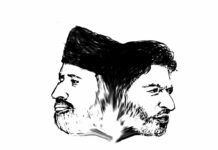Mehraj Din
The indispensability of every struggle revolves around the collective intellectual pool of scholars evolved within the decades of long struggle and resistance. In everyday usage in the languages and cultures with which I am familiar, an “intellectual” is a person who produces literature – that is, a novelist, poet, dramatist or any other branch of literary genre. I think it is generally true that in all cultures writers have a separate, perhaps even more honorific place. In addition these intellectuals are located in different institutional settings, some are leaders in NGOs, and others are found in academia, while others are engaged as “public intellectuals”, journalists, professors, trade union advisers, political party leaders, theologians and free-lance writers.
The continual dilemma, political instability and occupation shaped up a diverse intellectual response from Kashmiri nation manifesting itself into multi-variant oeuvres varying from “intellectual double-talkers” to “conscious responders”. Over 150 years ago, Ralph Waldo Emerson considered the meaning and functions of the intellectual in his great essay “The American Scholar”. Emerson’s intellectual, while enriched by the past, should not be bound by books. His most important activity is action while the intellectual inaction is cowardice.
What are the responsibilities of the intellectual? It’s an old question. Writers and journalists have often been called upon to act as defenders of free speech, for example, and sometimes have had to pay for their words with exile or with their lives. But their role is vital, especially in rousing opposition to dictatorial or otherwise illegitimate regimes. It is the job of the intellectual to give a voice to those who are unable to speak. As I see it, intellectuals are those who have diverse wisdom and foresight, who apply their intellect and forward-looking visions for the purpose of awakening society. They help to divert the masses from what is unwise and wrong toward what is righteous and the good. Immanuel Kant believed that intellectuals must get involved in the “public use of reason” where they understand the pros and cons of the occupational problem and try to contextualize the issue at the academic institutions. Edward Said talked of “contextualizing the discourse of occupation” and reframing the responses against the hegemony of oppressors.
Unfortunately, Kashmir is unable to develop such sort of idealistic intellectual acumen in the “intellectual class”. The reasons vary from contextual paradigms of societies but at the same time unconsciously turn us into a “part of oppressing regimes” where intellects rot in proffered luxuries. I find a great deal of truth in Einstein’s words: “The world is a dangerous place, not because of those who do evil, but because of those who look on and do nothing.” A person with capabilities and knowledge bears this kind of responsibility and owes his or her world the benefits of their profound wisdom.
Michel Foucault’s also believed that power today is not something that a small number of people possess and exert on everybody else, but rather a force that acts through every institution and relationship in society, so that our very sense of self is a product of its shaping force. For Foucault, the proper role of an intellectual is to expose the machinations of power and the systems of knowledge that justify, naturalize or conceal the operations of power. The “intellectual hubs” in Kashmir have unfortunately turned into “impractical machinations” and in Gramscian narrative “legitimizes the state oppression”. What we need from intellectuals is not leadership, but true contextualization of the problem, and assistance in navigating dense webs of institutional power.
The best and sufficed speech is the speech of God and how beautifully Allah puts the ignominy of suffering nation in the Quran, Surah Nisa, verse 75 “And what is [the matter] with you that you fight not in the cause of Allah and [for] the oppressed among men, women, and children who say, “Our Lord, take us out of this city of oppressive people and appoint for us from Yourself a protector and appoint for us from Yourself a helper?”
Mehraj Din is a doctoral candidate at Shah-i-Hamadan Institute of Islamic studies and can be mailed at [email protected]















